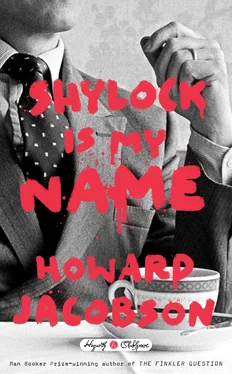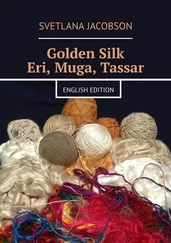And D’Anton? Which side of the confidentiality/ publicity debate was he on? She hadn’t canvassed his opinion. He didn’t know himself, she believed. Had she asked he would have said the quieter they kept this the better, but once she presented him with the fait accompli of Strulovitch abased, she didn’t doubt he would be pleased with her. Sometimes you know a person’s interest better than he knows his own.
Meantime, unmoved by her labial allure, this grave, legal figure stood between her and the effectuation of her plan.
“I hope I am not misunderstood,” she said. “My offer to make amends is not to be taken as any sort of admission of guilt. I befriended the girl. She was obviously unhappy at home. I had no idea that she had formed an unsuitable relationship under my roof. I would never have allowed it had I known. My close companion and advisor D’Anton feels the same, hence his brave acceptance of your client’s demands.”
“I’m an acquaintance of Mr. Strulovitch,” Shylock said. “I do not represent him or work for him.”
“Might I speak to him in person in that case.”
“He isn’t here. You can speak to me. He thinks of me as his conscience.”
Plurabelle knew not to say “Conscience! Are you telling me that man has a conscience?” Instead, she said, “Then you will gather that what he asks for is extreme. Nothing less than bodily and emotional injury to my dear friend D’Anton. It would appear to be a public humiliation he seeks, which is why, in order to satisfy that strange craving, I’m prepared — should it come to this — to host the event in my gardens.”
“The event?”
“It is Mr. Strulovitch himself, I gather, who would rather the course of action he proposes to take did not go unnoticed. Were he prepared to debate the rights and wrongs of what he asks with the person of whom he asks it, I’d be prepared to film that debate for my television show—”
“You have a television show?”
Plurabelle was dismayed. She didn’t think anyone was unaware of her television show. If this man did not know of it, it only showed how remote and eminent he was. “ The Kitchen Counsellor, ” she said.
“It’s a cookery programme?”
“Yes, but not only that—”
Shylock put up a hand to stop her telling him what else it was. “Mr. Strulovitch, to my certain knowledge, doesn’t think of himself as being party to a debate, doesn’t recognise an answering grievance to his own, and is therefore unlikely to be tempted to discuss the matter on a television programme of the sort you describe. I’m surprised you think your friend would be a willing party to it either. Circumcision is not a culinary happening.”
A thought occurred to Plurabelle. Bicker. Her old interactive Webchat site was now defunct but she felt confident it could be reactivated, via one or other of the social media with which she enjoyed professional relations. Might this, she wondered, giving Shylock a brief rundown, appeal to Mr. Strulovitch more?
“What I can with some confidence say would not appeal to Mr. Strulovitch,” Shylock assured her, “is the suggestion that the redress he seeks amounts to bickering.”
“I see that,” Plurabelle said quickly. “I don’t mean to minimise this. Quite the opposite. Hence my offer to make an occasion of it.”
“Are you planning a jamboree?”
“Should it come to it, should Gratan not return with Beatrice, as we all of course fervently hope he will, then yes, I will do as much or as little as Mr. Strulovitch sees fit. I only want it to be pleasant for everyone. If Mr. Strulovitch has an objection to my home and would rather not enter it—”
“Why would he rather not enter it?”
Plurabelle looked momentarily nonplussed. “Oh you know…”
“Because it has been the scene of debauchery?”
“You libel me,” Plurabelle said.
“Then you have nothing to fear.”
“I have nothing to fear.”
“You are going to great lengths to bring this matter to a conclusion in that case. I’d say your celerity speaks guilt. But go on with what you were saying. If Mr. Strulovitch would rather not enter your house…”
“I will arrange for a marquee to be put up in the garden.”
“What makes you think he draws a distinction between your house and your garden?”
“I don’t know what he draws. I wish only to be accommodating.”
“Will there be canapés?”
“If canapés are what he would like.”
“I am still trying to understand why you would go to this trouble to publicise what you yourself have called the humiliation of your friend.”
“Because,” she said, “I want to show how deeply sorry I am.”
“Your spirits,” Shylock said, looking away from her, “shine through you.”
Plurabelle, who knew a compliment when she heard one, ruffled her lips. This lawyer friend of Strulovitch’s had a stern charm, she thought, though she doubted that anyone but her would see it. Not charm of the D’Anton or Barney sort — he was another species of man entirely, icily distant and repellent if the truth be told, insulting and contemptuous even — but then she had had her fill of approachably attractive men, princely suitors who lined up to second-guess her desires and otherwise be pleasing to her. With this man it would be she who would have to do the guessing. Not that she was thinking of him erotically. He was too old for her. But looking on him as a father — and she had never been much impressed with the father nature had given her — yes, she could imagine being an unlessoned girl again, trying for his love.
“Do you have children of your own?” she asked him.
Strulovitch had a dream. Jessica and Beatrice, both aged about nine, frolicking in a plastic paddling pool in his garden, splashing water on each other, the sun illuminating their young bodies, not yet sirens, but tadpole girls looking to win the attention of no one, not even their fathers stretched out in deckchairs drinking icy beers. Was there ever such a time of innocence? Yes, in Strulovitch’s dream there was.
Kay was watering the garden with a hose that writhed, on account of the tap being turned full on, like a snake. Leah, standing by her, laughed her long Venetian’s laugh. Strulovitch, not innocent himself, desired them both. Two Jewish wives, two Jewish daughters — no wonder his mother and father playing gin rummy in the shade were pleased with him.
Shylock was asleep. This was Strulovitch’s dream, so Strulovitch could do with Shylock what he chose, and what he chose was to render him unconscious. So was Shylock dreaming too? Two Jewish daughters, two Jewish wives?
Tears flooded ancient Strulovitch’s dream. Molten tears, the colour of gold.
For whom?
It’s hard to tell in dreams.
—
“What news from the Rialto?” D’Anton asks his PA.
The answer never varies. “None.”
The colour rises in D’Anton’s cheeks.
—
Strulovitch asks the same of his. And receives the same answer.
There has been no colour in Strulovitch’s cheeks for several days.
—
Left to his own devices, Shylock wandered the house, looking at Strulovitch’s paintings. He had grown up in a beautiful city but had felt himself excluded from its splendours. Much of the art was housed in churches — indeed much of the art was the churches — and those were not for him to admire. If something he saw out of the corner of his eye struck him as lovely he kept it to himself. He didn’t even mention it to Leah. He wasn’t going to be caught appearing to covet what was not his.
Even here, unwatched in Strulovitch’s house, he felt self-conscious about looking. It compromised his fierce mistrust to be an appreciator. If he were to love what men had made he would next have to love what men were.
Читать дальше












